Federal regulators are calling for stricter requirements to fly hot air balloons after a crash near Lockhart last year that killed all 16 people aboard.
The National Transportation Safety Board on Tuesday released findings and recommendations of its investigation into the July 30 accident in which a balloon operated by the Heart of Texas Balloon Ride company struck high-voltage power lines about 30 miles south of Austin.
The board concluded that pilot Alfred Nichols had underlying health conditions and multiple medications in his system that likely impaired his ability safely navigate cloudy weather conditions that day.
NTSB Chairman Robert Sumwalt said during opening remarks that Nichols should not have been allowed to pilot the balloon ride even though he was legally licensed to do so.
"His depression, attention-deficit hyperactivity disorder and the combined effects of multiple central nervous system-impairing drugs likely affected the pilot’s ability to make safe decisions."
“This pilot was selling rides in a balloon that could carry more passengers than many airplanes and helicopters that are used in site-seeing tours, yet he was not required to have an FAA medical certificate," he said. "There is clearly a disconnect here.”
NTSB Medical Officer Nicholas Webster told the board that the drugs found in Nichols’ system diminished his ability to respond to weather conditions.
“His depression, attention-deficit hyperactivity disorder and the combined effects of multiple central nervous system-impairing drugs likely affected the pilot’s ability to make safe decisions,” he said.
Other medications investigators found in Nichols’ bloodstream included three prescription sedatives: the muscle relaxant cyclobenzaprine; the sedative diazepam, also known as valium; and the opioid pain medication oxycodone.
Webster also noted that the level of the antihistamine, diphenhydramine, commonly known as Benadryl, found in Nichols' system was enough to impair his ability to safely operate the balloon.
“At the level he was at, it had the impairing effect of a blood-alcohol [content] of 0.1. which is above the legal limit to operate a car in all 50 states,” he said.
The NTSB also found Nichols should have canceled the flight due to deteriorating weather conditions, as several other balloon operators in the area had done that morning.
The board is recommending the Federal Aviation Administration require balloon operators to have the same medical certification needed to fly airplanes and helicopters in the U.S. It also recommended that the FAA analyze its current policies and regulations regarding hot air balloons.
Rep. Lloyd Doggett, who represents the district where the crash occurred, says he’s been pushing the FAA for years to adopt the stricter standard for balloon pilots.
"The FAA has become closer and closer with the people it is supposed to regulate, and like many federal regulatory agencies, it is more interested in protecting the industry than protecting the public.”
In an email, the FAA said it “will carefully consider the NTSB’s recommendations.”
This post has been updated.




